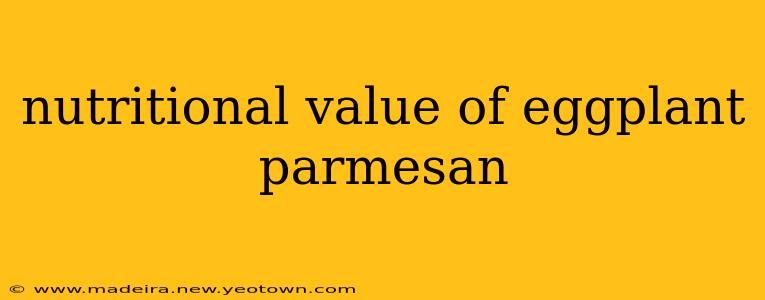Eggplant Parmesan, that glorious stack of fried eggplant slices, rich tomato sauce, melted mozzarella, and a sprinkle of Parmesan cheese… it’s a culinary masterpiece, a comfort food classic. But how does this indulgent dish stack up nutritionally? Let's peel back the layers and explore the nutritional value of eggplant parmesan, considering both its deliciousness and its health impact.
Our journey begins with the star ingredient: the eggplant itself. This versatile vegetable is surprisingly nutritious, boasting a good source of fiber, potassium, and manganese. Fiber aids digestion and helps you feel full, while potassium is crucial for maintaining healthy blood pressure. Manganese plays a vital role in bone health and metabolism.
However, the nutritional profile can change drastically depending on the preparation method. Traditional Eggplant Parmesan often involves deep-frying the eggplant slices, which significantly increases the fat and calorie content. This added fat, primarily saturated fat, can negatively impact cholesterol levels if consumed frequently.
What are the calories in eggplant parmesan?
The calorie count of Eggplant Parmesan varies wildly based on the recipe and serving size. A single serving can range from 300-600 calories or even more, depending on factors like the amount of cheese, breading, and oil used. Opting for a lighter version, perhaps baking instead of frying the eggplant, can significantly reduce the calorie count.
Is eggplant parmesan healthy?
This question doesn't have a simple yes or no answer. The healthfulness of Eggplant Parmesan hinges on how it's prepared. A traditionally prepared dish, heavy on the frying and cheese, won't be considered a health food. However, with some modifications, you can create a healthier version that retains the delicious flavor while reducing the negative aspects. Baked versions, using less cheese and a healthier breading (like panko breadcrumbs), can offer a significantly improved nutritional profile.
What are the benefits of eating eggplant parmesan?
Despite the potential downsides, there are some health benefits to be considered, especially with healthier preparations. The eggplant itself provides fiber and essential vitamins and minerals. The tomato sauce contributes lycopene, a powerful antioxidant linked to various health benefits. However, these benefits are often overshadowed by the high fat and calorie content of traditional recipes.
How many carbs are in eggplant parmesan?
The carbohydrate content, much like the calorie count, depends heavily on the recipe. The eggplant itself contributes some carbohydrates, as do the tomato sauce and breading. A typical serving could contain anywhere from 30-60 grams of carbohydrates, with a significant portion coming from refined carbohydrates if white bread is used in the breading.
Is eggplant parmesan good for weight loss?
Unfortunately, traditional Eggplant Parmesan is unlikely to be a beneficial addition to a weight-loss diet due to its high calorie and fat content. However, a lighter, healthier version, baked instead of fried and with reduced cheese, could potentially be incorporated into a balanced weight-loss plan, but portion control is vital.
Conclusion: Enjoy in Moderation
Eggplant Parmesan is a beloved dish for a reason – its flavor is irresistible. However, understanding its nutritional profile allows you to make informed choices. While it’s not a health food in its traditional form, mindful modifications can significantly improve its nutritional value, enabling you to enjoy this comforting classic without excessive guilt. Remember, moderation is key. Enjoy a smaller serving, choose healthier preparation methods, and savor every bite!

